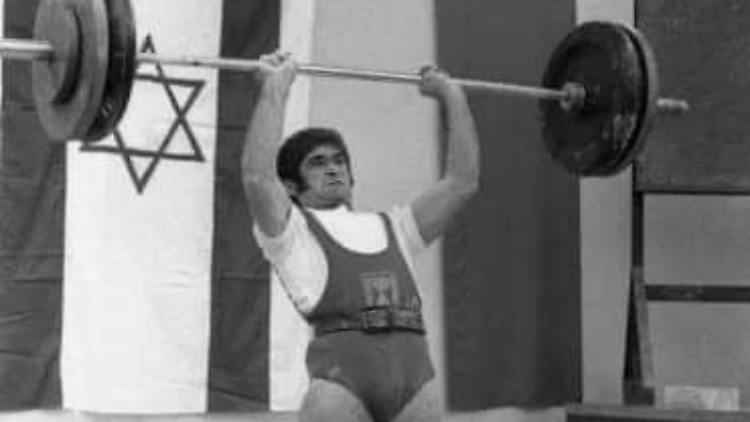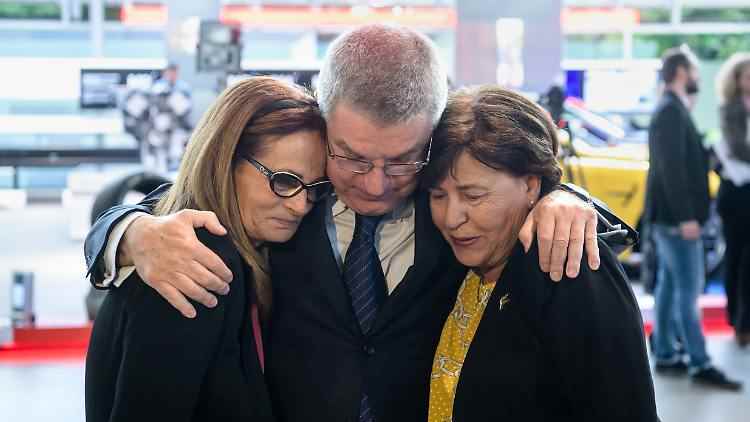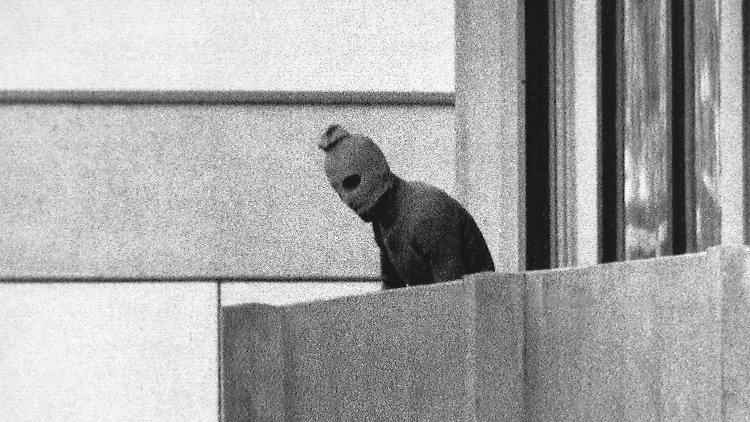At the 1972 Olympic Games in Munich, Palestinian terrorists from the Black September group attacked the Israeli quarters in the Olympic Village on September 5. After hours of negotiations and an unsuccessful rescue operation by the Bavarian security authorities, all eleven Israeli hostages, five Arab terrorists and a German policeman died.
Many commemorative events are planned for the 50th anniversary of the Olympic assassination, including at the Fürstenfeldbruck air base, where the liberation campaign in 1972 failed. Due to the deadlocked talks about the compensation payments to be negotiated, the victims’ relatives did not want to take part until the end. After weeks of negotiations, the bereaved and the federal government agreed on a payment totaling 28 million euros a few days before the commemoration ceremony. Shlomit Romano-Barzilay – the daughter of the murdered weightlifter Josef Romano – will also be present at the memorial event in Munich.
Shlomit Romano-Barzilay keeps alive the memory of her father and his dead sports comrades.
(Photo: Shlomit Romano-Barzilay private archive)
ntv.de: In a few days it will be the 50th anniversary of the attack on the 1972 Olympic Games. When we talk about Munich, what do you think about it?
Shlomit Romano-Barzilay: My relationship with Munich has changed over the years. When I was 16, I visited the Olympic Village for the first time during a youth exchange between Israel and Germany. I met a lot of people back then and was pleasantly surprised, because over the years we got to know each other better, became friends and I am still in contact with many of them to this day.
Don’t you still have an ambivalent relationship with the Bavarian state capital?
It is impossible to separate the pain I have experienced at home over the years from the revelations of the failures of the German authorities. On the one hand, I know the mighty, moral Germany, where everything has its order. On the other hand, however, I experienced the same state that failed to meet its moral obligations to the families of the victims of Munich.
You were six months old when your father was killed. When did you realize how he died?
Growing up, stories about him were everywhere. From an early age I visited his grave and numerous commemorative events. Nevertheless, my mother raised me and my two older sisters with a lot of love and without hate, even if she kept talking about him and the Munich 1972 tragedy. But it wasn’t until I was in my 20s and more and more of the assassination became public that I learned more details about my father’s cold-blooded murder and that the terrorists even desecrated his body. It’s very difficult to live with.
Several books, documentaries and films such as the Spielberg blockbuster “Munich” have been published about the assassination. How emotional was it for you to see someone play your father?
That was unusual, since I never met him as a grown woman and only know him from pictures, video and tape recordings. When I was little, one day the movie “The 21 Hours of Munich” was on TV. From all the stories I had heard up to that point, I was kind of hoping that maybe in the movie she would be rescued and everything would turn out fine.
Growing up without a father who was murdered by an Arab terrorist organization, did you feel hatred and anger towards the Palestinians?
No, only against the murderers and men behind the Olympic assassination. Not against the Palestinian people. Like any human being, they want to live a normal life. Some of my friends are Palestinians. We all want to live in peace. Unfortunately, there are many political leaders who keep rekindling the Israeli-Arab conflict for various interests.
Together with the other relatives of the victims of Munich in 1972, you commemorate the Olympic attack every year. How is it for you and your family when you visit Germany and Munich?
I’ve been to Germany many times now and I really like being there. I don’t feel any hostility to the country or its people, nor was I raised that way. But when I visit the Olympic Village in Munich or the museum – which was opened five years ago – I feel a deep sadness.
Also anger and disappointment?
Indeed. I always ask myself why the German security authorities couldn’t protect or free their guests. Why were the injured athletes not adequately cared for? How could something like this happen in a modern country like Germany?

Weightlifter Joseph Romano was not allowed to watch his daughter grow up.
(Photo: Shlomit Romano-Barzilay private archive)
How did you feel when you saw the victorious Israeli marathon team at the “European Championships 2022” in Munich a few weeks ago?
Of course, that really touched me. Somehow, after 50 years, things have come full circle.
Ankie Spitzer, the widow of fencing coach André Spitzer, has vowed she would never stop speaking out about this horrific act. How do you deal with your father’s legacy?
The Olympic assassination is omnipresent in Israel. Much is said and reported about it. Streets and schools are named after the victims. It’s amazing what Ankie Spitzer and my mother Ilana in particular have created over the last 50 years. Children learn about it in physical education. Some in my family have even had a weightlifter’s bar tattooed on their wrists. The stories of my father’s short life are passed down from one generation to the next.
At the London 2012 Games, the IOC waived a minute’s silence. The organization “just one minute” then demanded that this be done at every opening ceremony. Why did this only happen in Tokyo last year?
I don’t understand why we had to ask for this after all these years. This minute’s silence should be a matter of course at every opening ceremony, since the assassination happened on so-called Olympic soil. Of course we like to remember the wonderful athletes with all their victories and outstanding records. But the unpleasant events that are part of the history of the Olympic Games should not be forgotten either.
Has a German politician ever apologized to you?
Germany’s President Frank-Walter Steinmeier, whom we regard as a friend, is one of the few who took responsibility and worked wholeheartedly for fair compensation for the families of the victims.
And from those responsible who were there at the time?
Not that I know of. But lately there have suddenly been more and more people who received instructions or were supposed to be hiding information. If all the files of the Olympic assassination are published, it will be a great shame for Germany.
Have you ever met people from the Palestine Liberation Organization (PLO) who were probably involved in the attack?
No, but I wouldn’t have a problem with PLO officials who had nothing to do with it. But I could never meet people who were directly or indirectly involved in the assassination and who have blood on their hands.
Was there no compensation from Germany at the time?
Due to the statute of limitations, the laws in Bavaria had prevailed. There were then negotiations with the federal government, which paid the survivors a sum of three million euros 30 years after the attack. The money was divided among 25 people, but most of it went towards court costs.
What do you mean?
It wasn’t compensation then, as a modern state should be in our day and age. The families of the victims of the Lockerbie attack received $10 million each. The 1972 Olympics assassination was an act of terrorism that had to be assessed internationally. The Israelis were foreign guests who came to Munich and were not adequately protected. We wanted Germany to take responsibility for this, and this came at a price. A kind of compensation that is acceptable and not ridiculous.
What do you think was the reason?
Perhaps a mixture of a lack of understanding for our suffering and a lack of commitment when it comes to his moral duty.

IOC President Thomas Bach in 2017 with the survivors lana Romano, widow of the Israeli weightlifter Josef Romano (left), who was murdered in the hostage-taking, and Anke Spitzer, widow of the murdered Israeli fencing champion Andre Spitzer.
(Photo: picture alliance/dpa)
Shouldn’t Germany then also pay for the families of other terrorist attacks?
It’s a bit like running away from your own responsibility. With all due respect, there has never been an attack like the one at the 1972 Olympics, with the failure and unprofessional liberation action of the security authorities, on German soil. This cannot be compared with the other attacks, because in Munich Germany as a state was explicitly responsible for the security of the Olympic teams, even if the athletes were murdered by Palestinian terrorists.
She and the other survivors wanted to boycott the memorial service on September 5 in Munich because of the conflict-ridden negotiations about compensation payments. What were your demands on Germany and the Free State of Bavaria?
We didn’t ask for anything out of the ordinary, just clear standards. Compensation according to international standards. In addition, to assume political responsibility within the framework of an apology, as well as the processing of the events by a commission of German and Israeli historians, which will lead to the legally compliant release of the files.
What do you think of the response Palestinian President Mahmoud Abbas recently gave in Berlin after he was asked to apologize for Munich?
The word “Holocaust” is not a term that is simply mentioned. What the Palestinian leader and former financier of the Munich attack has allowed himself to do on German soil is a scandal. I think relativising the Holocaust is even punishable in Germany. (Editor’s note: That’s correct. Paragraph 130 of the German Penal Code, which incites hatred of the people, punishes the approval, denial and trivialization of National Socialist crimes.)
How did you find the behavior of Chancellor Olaf Scholz?
This made me even more upset and sad. Once again the German government showed the wrong reaction and that they learned nothing. The chancellor should have rebuked Abbas immediately that in his country one shouldn’t talk about the Holocaust like that. Just like 50 years ago, Germany was not prepared for Palestinian terror, even if this time it was only verbal. I think that with this relativization, Abbas primarily harmed his people. Because in Berlin he had the opportunity to apologize and say that violence is never the solution. As in 1972, he is again looking for the wrong way.
What about forgiveness?
Only when the whole truth comes to light will a gap in the heart close and life will somehow go on “normally”.
Also the belief in the Olympic oath?
In any case.
Tal Leder spoke to Shlomit Romano-Barzilay

